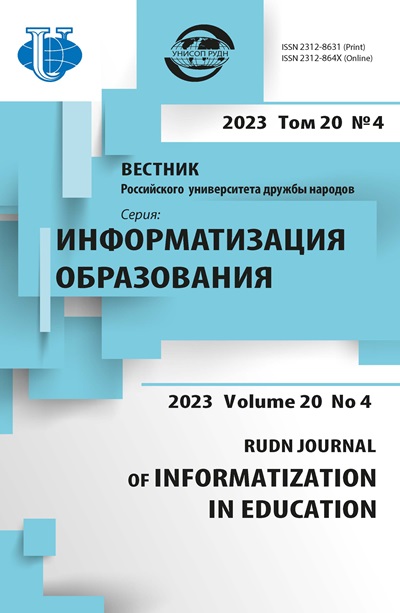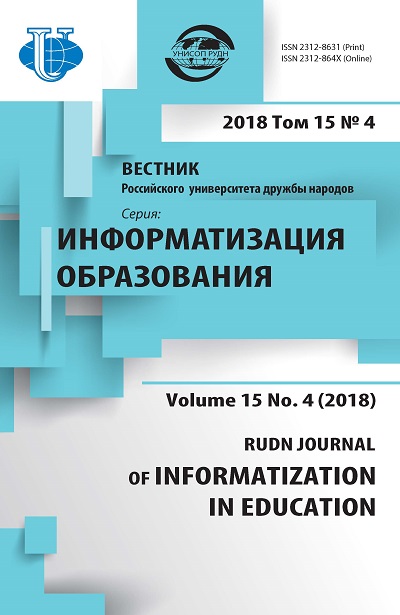The experiment with the use of information and communications technology and mobile devices as a tool of formation of research skills of students
- Authors: Aksenova O.V.1, Bodryakov V.Y.1
-
Affiliations:
- Ural State Pedagogical University
- Issue: Vol 15, No 4 (2018)
- Pages: 363-372
- Section: EDUCATIONAL ELECTRONIC PUBLICATIONS AND RESOURCES
- URL: https://journals.rudn.ru/informatization-education/article/view/20585
- DOI: https://doi.org/10.22363/2312-8631-2018-15-4-363-372
Cite item
Full Text
Abstract
At the present stage of development of education one of the priority of the teaching methods is the method islets. The authors developed a system of laboratory work in mathematics, which embodies the islets teaching method. The article describes one of the laboratory work “determination of the number e by measuring the parameters of the CEP line”, doing that, the students get specific skills in post and carrying out the experiment turn, the skills of document design research findings. The authors give theoretical justification and the results of the laboratory work fact the number e, obtained in the course of the experiment.
About the authors
Olga Vladimirovna Aksenova
Ural State Pedagogical University
Author for correspondence.
Email: aksenova421@yandex.ru
assistant of the chair of higher mathematics and methods of teaching mathematics, Ural state pedagogical university
9 K. Libknekhta St., Ekaterinburg, 620151, Russian FederationVladimir Yur’evich Bodryakov
Ural State Pedagogical University
Email: Bodryakov_vyu@e1.ru
doctor of physics and mathematical sciences, head of chair of higher mathematics and methods of teaching mathematics, Ural state pedagogical university
9 K. Libknekhta St., Ekaterinburg, 620151, Russian FederationReferences
- Avdeev N.F. Vzglyad neravnodushnogo professora na problemy vysshej shkoly [The view of the concerned professor on the problems of higher education]. M.: MGIU, 2006. 380 p.
- Aganina K.Zh., Telekbaeva K.U. Integraciya matematicheskih disciplin v processe podgotovki inzhenerno-tekhnicheskih special’nostej [Integration of mathematical disciplines in the preparation of engineering specialties]. Obrazovanie i nauka [Education and science]. 2012. Pp. 123—132.
- Vasenina E.A. Samostoyatel’naya laboratornaya rabota i komp’yuternyj praktikum kak metody primeneniya sredstv IKT v obrazovatel’nom processe [Independent laboratory work and computer workshops as methods of use of ICT in the educational process]. Informatika i obrazovanie [Computer science and education]. 2010. No. 10. Pp. 42—46.
- Vasenina E.A. Frontal’naya laboratornaya rabota kak metod primeneniya sredstv IKT v obrazovatel’nom processe [Frontal laboratory work as a method of application of means of information technologies in educational process]. Informatika i obrazovanie [Computer science and education]. 2010. No. 9. Pp. 62—65.
- Gorev P.M., Shuvalov K.I. Kurs “Izobretatel’skaya geometriya” dlya uchashchihsya 7–9 klassov v sisteme nepreryvnogo formirovaniya tvorcheskogo myshleniya shkol’nikov [The course “Inventive geometry” for students of 7—9 grades in the system of continuous formation of creative thinking of students]. Koncept [Concept]. 2016. No. 11. Pp. 1—9.
- Gurina I.A., Medvedeva O.A. Virtual’naya informacionno-obrazovatel’naya laboratoriya kak sredstvo razvitiya samostoyatel’nosti shkol’nikov [Virtual information and educational laboratory as a means of development of students’ independence]. Informatika i obrazovanie [Computer science and education]. 2007. No. 3. Pp. 107—109.
- Differencial’nye uravneniya. Uravneniya cepnoj linii [Differential equation. The equation of a catenary]. URL: http://www.math24.ru (accessed: 20.11.2017).
- Man’ Nguen Dyk. Organizaciya samostoyatel’noj raboty studentov pri izuchenii differencial’nyh uravnenij v pedvuzah V’etnama [The organization of independent work of students in the study of differential equations in the teacher training institutions of Vietnam]. Yaroslavskij pedagogicheskij vestnik [Yaroslavl pedagogical Bulletin]. 2011. No. 3. Pp. 160—164.
- Marko I.G. Ehksperiment kak sredstvo aktualizacii mezhpredmetnyh svyazej na urokah matematiki [Experiment as a means of actualization of intersubject connections at mathematics lessons]. Integraciya obrazovaniya [Integration of education]. 2013. No. 2(71). Pp. 62—65.
- Pavlova M.S., Lyubushkina L.M. Fizicheskij ehksperiment — sposob razvitiya tvorcheskogo myshleniya [Physical experiment is a way of developing creative thinking]. Fizika v shkole [Physics at school]. 2006. No. 1. Pp. 18—20.
- Pedagogicheskaya ehnciklopediya [Pedagogical encyclopedia]. Gl. red. I.A. Kairov, F.N. Petrov. T. 2. M.: Sovetskaya ehnciklopediya, 1965. 912 p.
- Polonskij V.M. Slovar’ po obrazovaniyu i pedagogike [The dictionary of education and pedagogy]. M.: Vysshaya shkola, 2004. 512 p.
- Prikaz Minobrnauki Rossii ot 04.12.2015 № 179 “Ob utverzhdenii federal’nogo gosudarstvennogo obrazovatel’nogo standarta vysshego obrazovaniya po napravleniyu podgotovki 44.03.01 Pedagogicheskoe obrazovanie (uroven’ bakalavriata)” [The order of the Ministry of Education and Science of Russia of 04.12.2015 No. 179 “on approval of the Federal state educational standard of higher education in the field of training 44.03.01 Pedagogical education (bachelor level)”]. URL: http://fgosvo.ru/fgosvo/92/91/4 (accessed: 20.11.2017).
- Prikaz Minobrnauki Rossii ot 06.03.2015 № 179 “Ob utverzhdenii federal’nogo gosudarstvennogo obrazovatel’nogo standarta vysshego obrazovaniya po napravleniyu podgotovki 11.03.01 Radiotekhnika (uroven’ bakalavriata)” [The order of the Ministry of Education and Science of Russia of 06.03.2015 No. 179 “on approval of the Federal state educational standard of higher education in the field of training 11.03.01 Radio Engineering (bachelor level)”]. URL: http://fgosvo.ru/fgosvo/92/91/4 (accessed: 20.11.2017).
- Prikaz Minobrnauki Rossii ot 17.05.2012 № 413 «Ob utverzhdenii federal’nogo gosudarstvennogo obrazovatel’nogo standarta srednego (polnogo) obshchego obrazovaniya» [The order of the Ministry of Education and Science of Russia dated 17.05.2012 No. 413 “on approval of the Federal state educational standard of secondary (full) general education”].
- Selevko G.K. Ehnciklopediya obrazovatel’nyh tekhnologij [Encyclopedia of educational technologies]. V 2 t. T. 1. M.: Narodnoe obrazovanie, 2005. 556 p.
- Teregulov D.F. Podgotovka budushchih uchitelej k ispol’zovaniyu naturno-vychislitel’nogo ehksperimenta pri obuchenii fizike [Preparation of future teachers for the use of full-scale computational experiment in teaching physics]: avtoref. dis.. kand. ped. nauk. Ekaterinburg: UrGPU, 2017. 24 p.
- Usova A.V., Bobrov A.A. Formirovanie uchebnyh umenij i navykov uchashchihsya na urokah fiziki [Formation of educational abilities and skills of pupils at physics lessons]. M.: Prosveshchenie, 1988. 112 p.
- Shirshova T.A., Polyakova T.A. Laboratornye raboty kak sredstvo motivacii i aktivizacii uchebnoj deyatel’nosti uchashchihsya [Laboratory work as a means to motivate and enhance the educational activities of teachers]. Omskij nauchnyj vestnik [Omsk scientific Bulletin]. 2015. No. 4(141). Pp. 188—190.
- Abimbade A., Afolabi S.S. A Study of Pedagogical Approaches of Mathematics Teaching in Southwestern States of Nigeria. International Journal of Asian Social Science. 2012. Vol. 2. No. 8. Pp. 1182—1192.
- Giacardi L. The emergence of the idea of the mathematics laboratory at the turn of the twentieth centery. “Did where you stand”. Proceedings of the Second “International Conference on the History of Mathematics Education” (October 2—5, 2011, New University of Lisbon, Portugal). Portugal, New University of Lisbon, 2011. Pp. 203—225.
- Shull P.J. Improved Learning of Engineering Mathematics through Hands-on, Real-world Laboratory Experiments. The Technology Interface Journal (Winter, Special Issue). 2009.
- Widjaja Y.B., Heck A. How a Realistic Mathematics Education Approach and MicrocomputerBased Laboratory Worked in Lessons on Graphing at an Indonesian Junior High Scool. Journal of Science and Mathematics Education in Southeast Asia. 2003. Vol. 26. No. 2. Pp. 1—51.
















